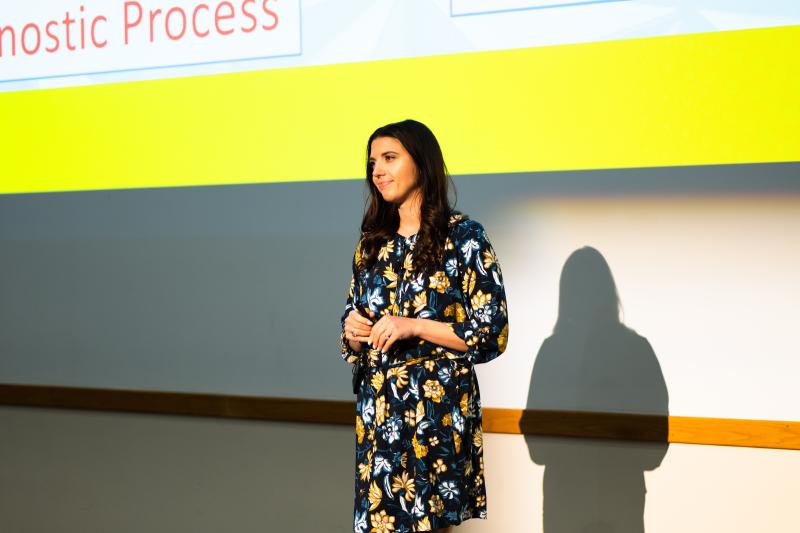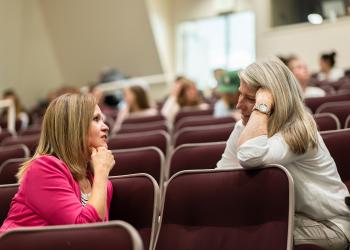
Dr. Alyssa Lanzi is an assistant professor of communication sciences and disorders at the University of Delaware, co-director of the Resilient Cognitive Aging Lab, and executive committee member of the Delaware Center for Cognitive Aging Research.
But “first and foremost,” she told audiences at BYU last month, she is “a granddaughter and a daughter,” and that identity strongly motivates her research into helping people with dementia maintain fulfilling relationships and experiences.
Lanzi’s seminar at BYU was part of the annual Visiting Scholar Seminar on May 17th, sponsored by the McKay School’s Communication Disorders Department to mark Better Speech and Hearing Month.
With her presentation, “Person-Centered Care Approaches for Adults At-Risk for Dementia,” Lanzi kept her audience engaged throughout her dynamic day-long workshop on developments in dementia research, how speech-language pathologists can aid people at risk for dementia, best practices, and tools that she uses to help at-risk individuals.
Lanzi called these presentations “the best part of the job” because they help her reach more people—in this case, educating audiology professionals on their role in the in-between stages of dementia.

Lanzi shared the experiences of her own grandmothers, who were independent until the end of their lives, and said this happy outcome can be the case for many people, provided they receive the right care. She said that everyone is affected by Alzheimer’s disease or dementia, because everyone knows and loves someone with the disease.
“You either age well or you don’t, but there is also an in-between,” she noted. “Is there possibly something we can do in the in-between stages?”
This in-between stage is the time between early signs of memory loss and an official diagnosis of dementia. Many people find themselves in this stage with little to no help in managing the lifestyle they have enjoyed for many years. One complicating factor is that dementia, and the progress of the disease, is a continuum, with a wide range of symptoms and side effects of varying levels of severity.
“The idea of the continuum is not black and white,” she said. “Even when you get to dementia there is a large umbrella. There is always something we can do to promote healthy aging."
The bulk of Lanzi’s presentation focused on this in-between time and the crucial role speech-language pathologists can play in helping patients navigate the lifestyle changes that mild cognitive impairments (MCI) bring. Speech-language Pathologists (SLPs) can also help delay the most major effects of dementia.
“We are underutilized as SLPs to educate on dementia,” she said, because SLPs have the tools and knowledge necessary to help people use lifestyle mediations like social engagement and to make interventions to treat hearing loss, mental health, and other cognitive interventions that can exacerbate MCI.
A sharper focus on memory through screening often, early, and differently will be crucial in MCI care, Lanzi said. She said that hearing plays a major role in all three stages of memory formation: encoding, storage, and retrieval. For example, in many memory screenings, screeners say individual words to the person receiving the test. If the person can’t hear the word, they cannot encode it and, thus, cannot retrieve it. As an alternative, Lanzi suggested performing hearing tests before memory screenings, because figuring out where along this process the hiccup in memory formation occurs will help create more tailored treatment plans.
“We need to rethink how we’re doing [memory screenings] and why we’re doing them,” she said. “There’s no tool that’s a perfect tool when it comes to memory screenings.”

Ending the conference, Lanzi introduced the Functional External Memory Aid Tool (FEMAT) as one way to help patients retain memory as the onset of dementia begins. Developed by Lanzi and colleagues at the Resilient Cognitive Aging Lab at the University of Delaware, the test’s purpose is “not to delay the condition, but [to] delay the impact on daily function.”
Imitating day-to-day tasks, the 15-minute test requires patients to recall 11 simple items, like the details of a birthday invitation. According to the FEMAT website, “a unique element of the FEMAT is that patients are encouraged to use external memory aids [e.g., a calendar or pill organizer] to complete the tasks during the 11-items.” The test is scored both for accuracy and for how the subject uses the external memory aid.
As the test’s focus illustrates, Lanzi is mostly concerned with helping patients maintain their independence as long as possible, which is why the FEMAT is available for clinics to use free of charge.
An overwhelming majority of attendees emerged from the seminar invigorated after drinking from the deep well of Lanzi’s knowledge. Many spoke about changes they intend to make in their own work or education to incorporate principles and practices taught by Lanzi: implementing more accurate treatment plans for their patients, using the FEMAT to assess their patients’ memory loss, and involving family members and other caregivers in treatment plans.
Writer: Lauren Hales
Media Contact: Andrew Devey